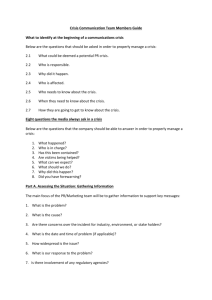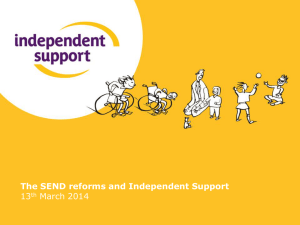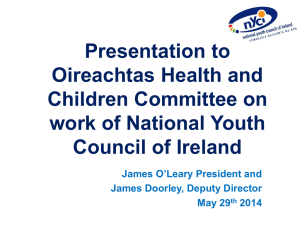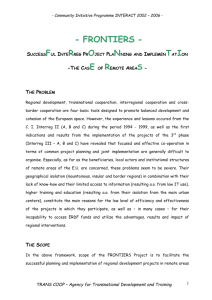G&BF Communications Strategy
advertisement
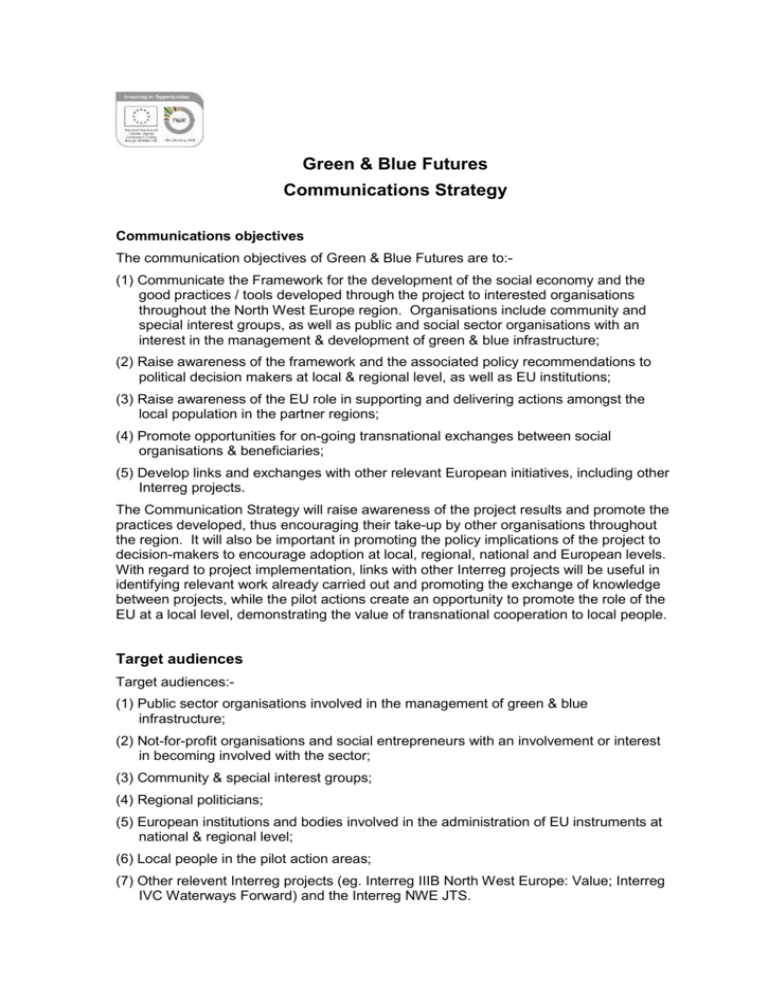
Green & Blue Futures Communications Strategy Communications objectives The communication objectives of Green & Blue Futures are to:(1) Communicate the Framework for the development of the social economy and the good practices / tools developed through the project to interested organisations throughout the North West Europe region. Organisations include community and special interest groups, as well as public and social sector organisations with an interest in the management & development of green & blue infrastructure; (2) Raise awareness of the framework and the associated policy recommendations to political decision makers at local & regional level, as well as EU institutions; (3) Raise awareness of the EU role in supporting and delivering actions amongst the local population in the partner regions; (4) Promote opportunities for on-going transnational exchanges between social organisations & beneficiaries; (5) Develop links and exchanges with other relevant European initiatives, including other Interreg projects. The Communication Strategy will raise awareness of the project results and promote the practices developed, thus encouraging their take-up by other organisations throughout the region. It will also be important in promoting the policy implications of the project to decision-makers to encourage adoption at local, regional, national and European levels. With regard to project implementation, links with other Interreg projects will be useful in identifying relevant work already carried out and promoting the exchange of knowledge between projects, while the pilot actions create an opportunity to promote the role of the EU at a local level, demonstrating the value of transnational cooperation to local people. Target audiences Target audiences:(1) Public sector organisations involved in the management of green & blue infrastructure; (2) Not-for-profit organisations and social entrepreneurs with an involvement or interest in becoming involved with the sector; (3) Community & special interest groups; (4) Regional politicians; (5) European institutions and bodies involved in the administration of EU instruments at national & regional level; (6) Local people in the pilot action areas; (7) Other relevent Interreg projects (eg. Interreg IIIB North West Europe: Value; Interreg IVC Waterways Forward) and the Interreg NWE JTS. Input from these audiences will be solicited through a range of promotional approaches. These include promotional channels such as the project website (& associated promotion of the site through, for example, partner websites), direct mail, attendance at relevant events with the G&BF stand, articles / features in the media. Opportunities will be sought to use existing platforms to reach audiences eg. the project results will be promoted via the Europarc and other networks to managers of green infrastructure and via Social Economy Europe to social organisations. Direct approaches to EU institutions will be made to promote the policy recommendations, supplemented by articles in the European media and attendance at international events (eg. the NWE annual conference; Open Days in Brussels etc.) At a local level, a key element of engagement will be through encouraging local people & stakeholders to participate directly in the project. The pilot actions will involve a wide range of participants and beneficiaries from local stakeholder organisations. Where feasible, local events will be organised round the pilot actions to raise visibility of the project & the role of EU support. Also the direct involvement of politicians in the pilot actions will be sought eg. as volunteers. Messages Main messages against the target audiences listed above are:(1) Public authorities - communicating good practice & tools to support the involvement of the social economy in managing green & blue infrastructure, as set out in the Framework. This will demonstrate how management of the infrastructure via the social economy can be cost effective, while delivering wider benefits to society; (2) Not-for-profit organisations / social entrepreneurs - Promoting good practice models & tools for managing the relationships between stakeholders and delivering social outcomes, together with opportunities for on-going transnational exchanges between actors; (3) Community & special interest groups - Promoting wider stakeholder involvement and "ownership" of projects and communicating the good practice & tools through the Framework; (4) Regional politicians - Promoting the policy recommendations to gain political support and encouraging local political involvement in the pilot actions; (5) European institutions - Promoting the policy recommendations to encourage take-up in EU policy & programmes; (6) Local people - Communicating the value of EU support & funding at a local level; (7) Other Interreg projects - Developing links for mutual exchanges and promotion of results. Communications tools A number of tools will be developed to promote general information regarding the project to all audiences. These are (1) a project website, which will be used to set out progress with implementation of the project, and display & promote project outputs in terms of reports etc.; (2) A project brochure & newsletters to provide information about the project and its progress for circulation to interested audiences through the website and at events, conferences etc.; (3) Project panels - to form a stand for use at events & conferences, setting out the project aims & objectives. Other specific tools will be:(1) the Final Conference (in WP4), aimed at attracting a wide participation from organisations & political institutions with an interest in the project outcomes; (2) Articles in relevant publications / news media; (3) Participation in other Interreg & other transnational events, using the project stand where appropriate; (4) Participation of politicians at project meetings, events & the pilot actions in WPs 2 & 3; (5) Press releases concerning project actions at EU, national, regional and local levels; (6) Communication of news items via the Interreg NWE website and via participation at NWE-organised events as appropriate; (7) Direct meetings with EU policy & programme officials regarding the policy recommendations; (8) Promotion of the Framework to specific audiences via other relevant networks eg. Europarc, Social Economy Europe. Communications activity in the project will be overseen by a Communications Sub-group, led by British Waterways with participation from all partners. Evaluation Measures to evaluate the project communications consist of:(1) Website visits; (2) Number of publications / media products & copies distributed; (3) Number of press releases issued; (4) Instances of media coverage - TV/radio, press, magazine articles etc; (5) Number of partner workshops & participants in these; (6) Number of people & days involved in partnership exchanges; (7) Number of people attending the Final Conference; (8) Number of stakeholder organisations involved in the pilot actions & partnership events; (9) Number of politicians involved in project activity; (10) Number of beneficiaries benefiting through the pilot actions; (10) Number & type of external events attended; (11) Number of meetings / events organised to promote the policy recommendations.
